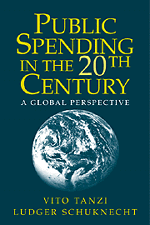Crossref Citations
This Book has been
cited by the following publications. This list is generated based on data provided by Crossref.
Schuknecht, Ludger
1999.
Fiscal policy cycles and the exchange rate regime in developing countries.
European Journal of Political Economy,
Vol. 15,
Issue. 3,
p.
569.
Tanzi, Vito
2000.
Globalization and the Future of Social Protection.
IMF Working Papers,
Vol. 00,
Issue. 12,
p.
1.
Mosley, Layna
2001.
Global Capital and National Governments.
McNab, Robert Martin
and
Melese, Francois
2001.
Implementing GPRA: Examining The Prospects For Performance Budgeting In The Federal Government.
SSRN Electronic Journal,
Pearce, David
and
Palmer, Charles
2001.
Public and private spending for environmental protection: a cross‐country policy analysis.
Fiscal Studies,
Vol. 22,
Issue. 4,
p.
403.
Alesina, Alberto F.
Glaeser, Edward L.
and
Sacerdote, Bruce
2001.
Why Doesn't The US Have a European-Style Welfare State?.
SSRN Electronic Journal ,
Falk, Richard
2001.
Religion and Humane Global Governance.
p.
13.
Barros, Carlos Pestana
and
Lucas, Jaime
2001.
Sports managers and subsidies.
European Sport Management Quarterly,
Vol. 1,
Issue. 2,
p.
112.
Alesina, Alberto F.
Di Tella, Rafael
and
MacCulloch, Robert
2001.
Inequality and Happiness: Are Europeans and Americans Different?.
SSRN Electronic Journal ,
Frey, Bruno S.
2001.
Flexible Citizenship for a Global Society.
SSRN Electronic Journal,
Selvaraju, V.
2001.
Budgetary Subsidies to the Health Sector among Selected States in India.
Journal of Health Management,
Vol. 3,
Issue. 2,
p.
261.
International Monetary Fund
2001.
Transition Economies: How Appropriate is the Size and Scope of Government?.
IMF Working Papers,
Vol. 01,
Issue. 55,
p.
1.
Therkildsen, Ole
2002.
Keeping the state accountable: is aid no better than oil?.
IDS Bulletin,
Vol. 33,
Issue. 3,
p.
1.
Alt, James E.
Lassen, David Dreyer
and
Skilling, David
2002.
Fiscal Transparency, Gubernatorial Approval, and the Scale of Government: Evidence from the States.
State Politics & Policy Quarterly,
Vol. 2,
Issue. 3,
p.
230.
Getzner, Michael
and
Neck, Reinhard
2002.
Kompendium der österreichischen Finanzpolitik.
p.
228.
STEINMO, SVEN
2002.
Globalization and Taxation.
Comparative Political Studies,
Vol. 35,
Issue. 7,
p.
839.
Mehrotra, Santosh
and
Delamonica, Enrique
2002.
Public spending for children: an empirical note.
Journal of International Development,
Vol. 14,
Issue. 8,
p.
1105.
O’Shaughnessy, John
and
O’Shaughnessy, Nicholas Jackson
2002.
Postmodernism and Marketing: Separating the Wheat from the Chaff.
Journal of Macromarketing,
Vol. 22,
Issue. 1,
p.
109.
Lassen, David Dreyer
and
Alt, James E.
2003.
Fiscal Transparency, Political Parties, and Debt in OECD Countries.
SSRN Electronic Journal ,
Weede, Erich
2003.
Die Verbesserung des menschlichen Zusammenlebens.
p.
65.





